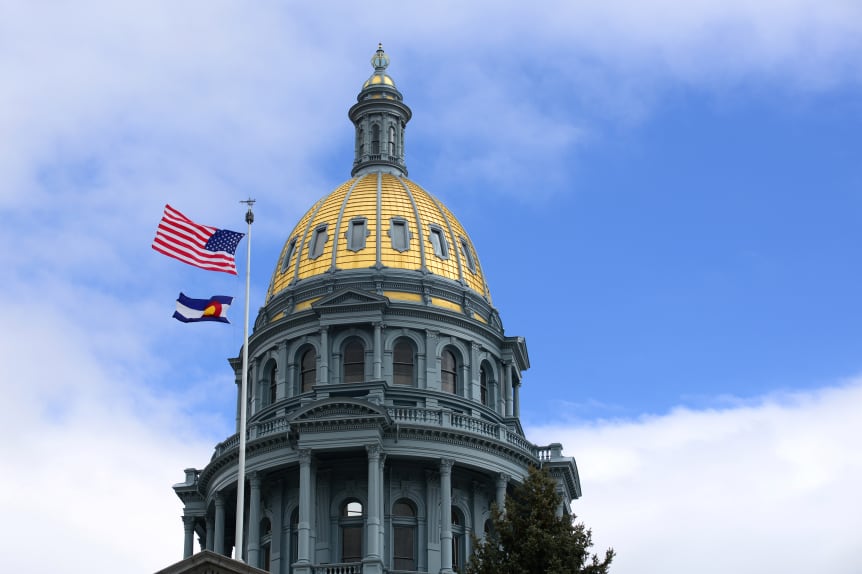Every January, 100 men and women elected to the Colorado General Assembly gather in Denver for 120 days and make decisions that affect students and teachers in the classroom, university administrators trying to balance their budgets, and parents and students having to make tuition payments.
Legislators only have to pass two bills before they adjourn in May: a balanced budget and the school finance act. Both have profound implications for educational opportunity.
They also tackle many more education issues, from student discipline to teacher shortages, from standardized tests to career training.
But it can be hard for ordinary citizens to understand how ideas turn into laws.
To explain the lawmaking process and the opportunities for public input, we’ve prepared this guide to the legislative session.
Here’s how you can get involved:
How a bill becomes a law
Think Schoolhouse Rock’s “I’m Just a Bill.”
Legislators get ideas for bills from a lot of places. A legislator might have a passion for a particular topic. The governor’s office or state department leaders might request a policy change. An interest group or concerned parents might ask a lawmaker to help solve a problem.
Lawmakers work with bill drafters — nonpartisan legislative staff — to write a bill. Once a lawmaker introduces it, leaders in either the House or the Senate assign it to a committee, usually one with relevant expertise.
Most education bills go to the education committee, but a bill on youth mental health might land first in the health committee or one on police in schools might be heard by the judiciary committee.
A few committees — most infamously the State Affairs committees — are known as “kill” committees, where leadership can send controversial bills, especially those from the opposing parties, to ensure they don’t reach the floor.
A bill must win committee approval to proceed to the full House or Senate. Some bills might need to go through more than one committee.
Bills must get approved twice in the first chamber, before heading to the next chamber and doing it all over again. Bills can be amended at any point in the process, and both chambers must sign off on the same final form of a bill.
Then the governor must sign it into law.
Who has a vote on the Colorado education committees
The House Education Committee has 11 members, seven Democrats and four Republicans. Find the committee schedule, documents, and live and archived audio at the committee website. Members are:
- Chair Rep. Barbara McLachlan, a Durango Democrat
- Vice Chair Rep. Matthew Martinez, a Monte Vista Democrat
- Rep. Jennifer Bacon, a Denver Democrat
- Rep. Mary Bradfield, ranking member, a Colorado Springs Republican
- Rep. Eliza Hamrick, a Centennial Democrat
- Rep. Anthony Hartsook, a Parker Republican
- Rep. Meghan Lukens, a Steamboat Springs Democrat
- Rep. Dafna Michaelson Jenet, a Commerce City Democrat
- Rep. Rose Pugliese, a Colorado Springs Republican and assistant minority leader
- Rep. Don Wilson, a Monument Republican
- Rep. Mary Young, a Greeley Democrat
The Senate Education Committee has seven members, four Democrats and three Republicans. Find the committee schedule, documents, and live and archived audio at the committee website.
- Chair Sen. Janet Buckner, a Denver Democrat
- Vice Chair Sen. Janice Marchman, a Loveland Democrat
- Sen. Rhonda Fields, an Aurora Democrat
- Sen. Chris Kolker, a Centennial Democrat
- Sen. Paul Lundeen, ranking member, a Monument Republican
- Sen. Mark Baisley, a Woodland Park Republican
- Sen. Janice Rich, a Grand Junction Republican
Find the names and contact information of all current Colorado lawmakers here. And find maps of current legislative districts here.
Can you speak on a bill or submit testimony?
If you’re interested in having your perspective heard, there are a few ways to get involved.
You can speak on the bill in person or remotely, or submit a written statement to the committee. The sign-up process is not difficult. Just fill out this online form.
Speakers are generally limited to two to three minutes, so think about how to make your point quickly and clearly.
Want to know the schedule?
The full schedule of the House and Representatives can typically be found on the Colorado General Assembly’s landing page.
The session schedule should be posted daily and gets updated as bills move through the process.
Here’s how to look up Colorado General Assembly bills
You can go to the Colorado General Assembly’s bill search page. There you can search by a bill number, the sponsor, or a topic.
When you click on a bill, you’ll see information such as a summary of what the bill does, the full text of the bill, and other relevant information, such as a fiscal note that explains how much passing the law would cost the state. Often the description of a bill in the fiscal note is easier to understand than the bill language itself.
You can also search through tabs near the bottom of the page that include the bill’s history, when it’s scheduled to be heard again, any amendments, and a summary of the committee votes.
What’s the Joint Budget Committee and why is it so important?
The six-member Joint Budget Committee is the most influential committee in the Colorado General Assembly. Why? Because it writes the budget that guides the state’s priorities. The committee members this year are four Democrats and two Republicans. The chair is state Rep. Shannon Bird, a Westminster Democrat.
Yes, Gov. Jared Polis does submit a budget every November. And those priorities guide the Joint Budget Committee’s work. But the committee ultimately writes the budget that gets submitted to the Colorado General Assembly for approval.
Other lawmakers also have a chance to submit budget amendments that reflect their own spending priorities — but lawmakers need to pass a balanced budget and the Joint Budget Committee will strip out amendments that endanger that goal.
The budget shapes every facet of state government, including K-12 and higher education spending.
Learn more about the budget process here.
Read more
Need a refresher on what happened last year? We rounded up the most important education issues of the 2023 session.
Want to know more about how lobbying affects the legislative process? Check out our deep dive on education lobbying from 2022 in collaboration with data reporter Sandra Fish.
Have questions? We’re listening at co.tips@chalkbeat.org.
Watch Chalkbeat Colorado’s 2024 Legislative Preview
Watch Chalkbeat Colorado’s annual discussion of key education topics likely to surface during the upcoming legislative session.
We were joined by:
- Sen. Janet Buckner, an Aurora Democrat and chair of the Senate Education Committee
- Sen. Rachel Zenzinger, an Arvada Democrat and vice chair of Joint Budget Committee
- Rep. Jennifer Bacon, a Denver Democrat and House Assistant Majority Leader
- Rep. Barbara McLachlan, a Durango Democrat and chair of the House Education Committee
- Rep. Rose Pugliese, a Colorado Springs Republican and House Assistant Minority Leader
A special thanks to our event sponsor, the Colorado Education Association. And thank you to our event partners, Young Invincibles and the Morgridge College of Education at the University of Denver.
Jason Gonzales is a reporter covering higher education and the Colorado legislature. Chalkbeat Colorado partners with Open Campus on higher education coverage. Contact Jason at jgonzales@chalkbeat.org.







